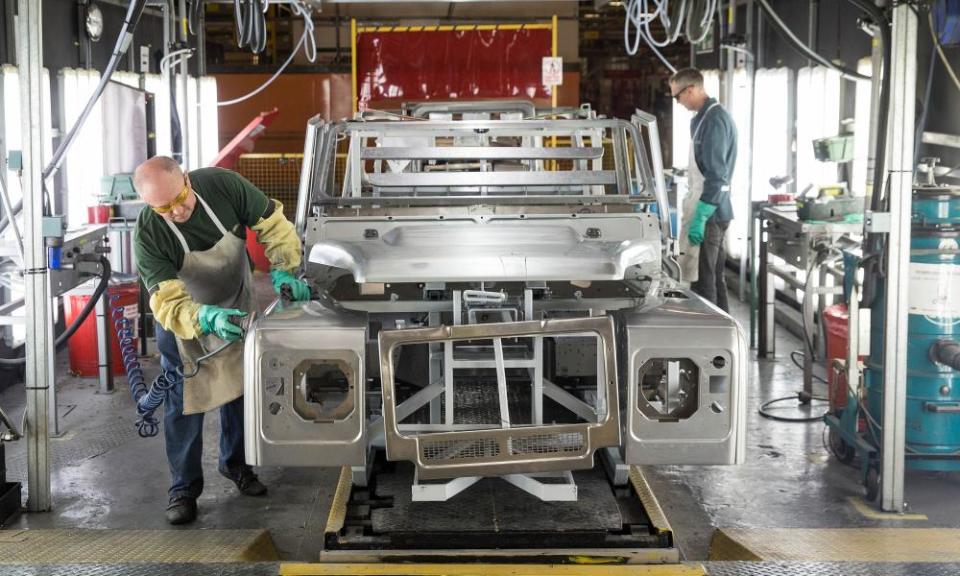UK manufacturers tell May no EU deal is 'simply unacceptable'

Failing to secure a Brexit trading deal with the EU would be disastrous for Britain’s manufacturers and Theresa May’s claim that no deal would be better than a bad deal is “simply unacceptable”, industry leaders have warned.
As the prime minister prepares to trigger article 50 on Wednesday, the EEF, the trade body for manufacturers, has warned a decision to walk away from the negotiating table would be a “lose-lose” outcome for both the UK and the EU.
May warned European leaders in January that she would be prepared to walk away if negotiations did not go favourably.
But in a new report EEF said the manufacturing sector would be badly affected by losing access to the single market and the customs union and that not having a new trade deal would leave it particularly exposed on day one. If there is no agreement between Britain and the EU then businesses could face World Trade Organisation tariffs of more than 5% on exports to the continent. The research described suggestions that the UK could walk away with no deal as “simply unacceptable to an industry that accounts for 45% of all UK exports”.
Terry Scuoler, chief executive of EEF, added: “Undermining the building blocks of this relationship [with the EU] – the single market and the customs union – without any other supportive structure in place would undoubtedly hurt our industry and condemn us to a painful and costly Brexit.
“The idea of being able to walk away empty-handed might be a negotiating tactic, but it would in reality deliver a risky and expensive blow. The rhetoric from the UK government needs to focus instead on achieving a deal that will work for the UK and the EU.
“Close consultation between government and industry is now vital if we are to successfully deliver a deal that supports trade and minimises costs and uncertainty. Brexit will be the most complex unravelling that any UK government is ever likely to have to undertake and the government will need the help of industry to identify, understand and mitigate the implications.”
Britain’s manufacturing industry directly employs 2.7 million people as well as accounting for 45% of exports. The EU is UK manufacturing’s biggest trading partner and businesses have complex supply chains that span the continent. For example, car parts can cross the English Channel as many as four times before they end up in a finished vehicle. The average UK-built car has about 6,000 parts with just 41% built in the country.
EEF said one of the government’s first priorities in the Brexit negotiations should be to secure the UK full membership of the WTO. It also wants the government to clearly set out its approach to the movement of goods and people and a commitment to a transition period so that firms can adapt to changes on a phased basis. Furthermore, it wants Britain to retain some key trading conditions from Europe such as harmonised product standards.
A government spokesperson said: “The prime minister has been absolutely clear that we will pursue a bold and ambitious free trade agreement with the European Union as a priority – allowing for the freest possible movement of goods between Britain and the EU.
“On top of that, leaving the EU will present us with a unique opportunity to strike trade agreements with countries across the rest of the world while our industrial strategy will get the economy firing on all cylinders and prepare us for the future.”
A separate report found UK households have become more downbeat about the economic consequences of Brexit. The proportion of people who feel the outlook for the economy over the next decade has worsened as a result of the Brexit vote rose to 53% in March according to a survey by Markit, up from 42% in July last year, immediately after the referendum.
Just 29% of people asked now consider Brexit to be beneficial to the long-term health of the economy, down from 39% in July.
Chris Williamson, chief business economist at IHS Markit, said pessimism had become more widespread across all age groups and income brackets.
“Shortly after the referendum, the older generations and the very poorest families were the exceptions in considering Brexit to be beneficial to the long-term health of the economy. However, even these pockets of the population have now become pessimistic,” he added.
“The most marked turnaround is evident among the poorest paid, who have switched from being the most optimistic to now being the most downbeat.”
People in Scotland were the most pessimistic, followed by those in the north-east and London.

 Yahoo Finance
Yahoo Finance 